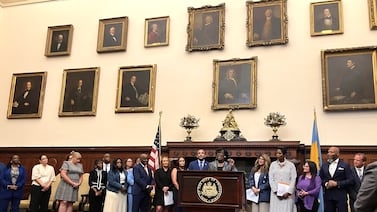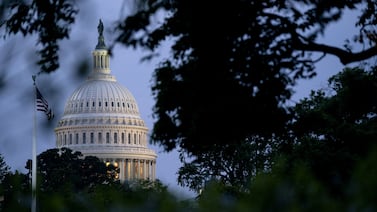Sign up for Chalkbeat Tennessee’s free newsletter to keep up with statewide education policy and Memphis-Shelby County Schools.
The Memphis-Shelby County school board passed the $1.9 billion 2025-26 district budget Wednesday that will fund the return of fall and spring break academies, staffing incentives, and a new preventative maintenance team to address longstanding building issues.
The school board scaled back $30 million of proposed school fire safety and HVAC upgrades from the budget after not receiving full funding from the Shelby County Commission for a $35 million investment toward deferred maintenance issues.
The district will instead direct $5 million to pressing safety issues, using $4.5 million to update intercom systems in 25 schools and the rest of the money to replace elevators in two schools.
At the budget meeting, MSCS assistant superintendent of operations Tito Langston said some schools are relying on two-way radios to communicate across campus.
“We have to be able to communicate with our students in case there are any emergencies,” said board member Natalie McKinney.
The budget is still fluid, Langston reminded board members. The board can amend the budget until the end of the month and readdress the fire and safety issues later this year. The budget requires final approval from the county commission later this month.
Interim Superintendent Roderick Richmond’s first budget does not include any major staff cuts one year after more than 1,000 positions were cut.
MSCS was thrown a budgeting curveball this spring when a new federal directive essentially blocked districts from spending out the remainder of pandemic-era relief funds.
With more than $55 million on the table, the district had intended to direct the funds toward long-awaited heating and air conditioning systems in schools. Last August, at least 12 Memphis schools had to close early on the first day of school due to high temperatures and A/C issues.
The district has applied for an extension to use the funds that has yet to be approved.
Before the budget vote, Langston said if the district can get the $55 million back, or at least a portion of it, the board could reassess the capital projects in several months. The approved budget removed $18 million of proposed HVAC updates and $8 million of proposed fire alarm replacements.
The budget would fund 40 new “mobile” security officers and 10 new multilingual teachers, in addition to a $30 million injection for specialized education assistants. The district has relied on the assistants to support K-2 classrooms.
Melissa Brown is the bureau chief for Chalkbeat Tennessee. Contact Melissa at mbrown@chalkbeat.org.






